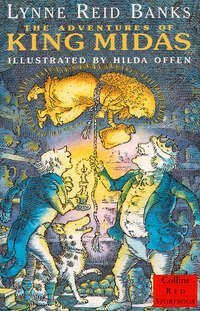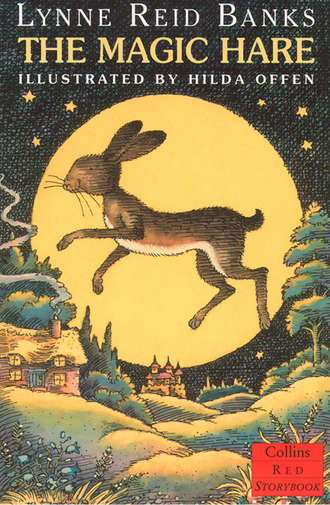
Полная версия
The Magic Hare

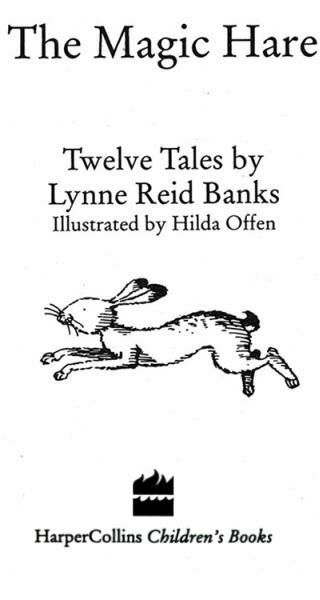
To Theatre of the Heartwhere Hare began.
Table of Contents
Title Page
Dedication
The Hare and the Spoilt Queen
The Hare and the Flower
The Hare and the Orphan
The Hare and the Giants
The Hare and the Vampire
The Hare and the Lazy Hunter
The Hare That Cured Hiccups
The Hare and the Dragon
The Hare and the Black-and-White Witch
The Hare With the Diamond Tail
The Hare and the Wicked Uncle
The Hare and his Magic
Keep Reading
Also by the Author
Copyright
About the Publisher
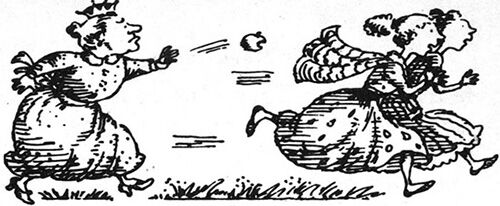
The Hare and the Spoilt Queen
Once there was a spoilt queen. She was bad tempered and terribly unfair. She blamed her people for everything that went wrong.
For instance, at her coronation, just as the Archbishop set the crown on her head, she bent over to scratch a sudden itch on her instep and her crown fell off and rolled down the steps leading to the throne.
She ranted and raved that it was every-one’s fault but hers, and spoilt the whole occasion so thoroughly that nobody took pictures of her. Then she got furious again because her picture wasn’t in the papers or on television. She closed all the TV stations and newspapers down, so nobody knew what was happening.
To cheer her up, her people held a big festival for her. They planned it weeks in advance and worked very hard to make it a success. When the day came – it rained. The queen jumped up and down, shouting that it was all their fault for choosing a rainy day to hold the festival on.
All the people felt very miserable. The queen wasn’t speaking to any-one. There was no telly. Nobody knew what to do.
One day the spoilt queen was out walking in the palace garden with two scared ladies-in-waiting. They kept just behind her and held hands because they were so frightened that she would find something to blame them for.
She pulled an apple crossly off a tree and bit into it. Then she spat out the piece, turned on the two ladies-in-waiting and screamed:
“This apple is sour! How dare you let me pick it when it’s not ripe!”
And she threw it straight at them.
They didn’t bother arguing that it wasn’t their fault. They just turned and ran.
That left the queen on her own. She stamped and fumed in the long grass, shouting at the top of her voice: “I HATE EVERYONE!” But suddenly, just near her stamping feet, she saw a little furry head with long ears.
She stopped carrying on, and said: “Oh! A hare in my orchard!” She didn’t know whether to be pleased or annoyed, but as usual she chose to be annoyed. “You’re trespassing, hare! Go away at once.”
“Oh, all right,” said the hare. “If you prefer to be alone.” And he hopped off.
“Wait!” cried the queen imperiously. The hare stopped and looked back. “I didn’t know you could talk. That makes a difference. Come back and talk to me.” She was used to ordering everyone about, but the hare didn’t move.
“Come here, I said!” shouted the spoilt queen, stamping her foot.
“‘Please’ would be nice,” said the hare.
“‘PLEASE’!” echoed the queen. “A queen doesn’t have to say ‘please’!” The mere idea shocked her.
“Well, I don’t know much about queens, but personally I don’t like talking to anyone who doesn’t say please. And thank you,” said the hare very reasonably.
“You impertinent little animal!” cried the queen. “Do you presume to teach me manners?”
“Not at all,” said the hare. “I don’t care how you behave. All I said was that ‘please’ would be nice. Because I like things nice.” And he made off in great bounds, ignoring the queen’s shouts at him to come back immediately.
That night the queen summoned her gamekeeper.
“There’s a hare in the orchard,” she said. “I want him for the pot. Shoot him.”
The gamekeeper trembled in his boots.
“That hare can’t be shot, Your Majesty,” he muttered. “He’s a magic hare. If you try to shoot him, he vanishes.”
“A magic hare! I should have guessed,” said the queen. “Then trap him for me – I want him alive.”
“He can’t be trapped either, Ma’am.”
“Then how am I to get my hands on him? I want him for my very own magic hare!”
The gamekeeper shook his head. “Nothing to be done,” he said.
“This is all your fault, you stupid man!” railed the queen. “It’s your job to catch game for me! You’re dismissed!”
The gamekeeper, who had five children to feed, went away sadly. There was a lot of unemployment among gamekeepers.
No sooner was he out of the door than the hare appeared in front of the throne. The queen was so surprised that she jumped.
“How can you be so mean?” he asked indignantly.
“I do as I like! I’m the queen!” screamed the queen.
“More’s the pity, if you ask me,” muttered the hare.
“What’s that you said?”
“I said, more’s the pity. I should think your subjects would rather have almost any other queen than you.”
The queen’s mouth fell open. She was speechless. She had never in her whole life been spoken to like that, not even by her nanny when she was little.
The hare didn’t take advantage of her speechlessness to tell her off some more. Instead he did a little dance.
This had an extraordinary effect on the queen. It calmed her down. She sat watching the hare leaping about and her heartbeat slowed, her eyes lost their anger, and her fists unclenched.
Then something very strange happened. She found she had got to her feet and begun dancing, too, jumping and kicking her legs about just like the hare. Fortunately there was no one watching or they would have thought it very undignified.
The hare finished his dance. The queen stopped too, breathless.
“I’m quite thirsty after that!” said the hare cheerfully. “Could you fancy a glass of water?”
“Water? I don’t drink—” began the queen faintly. But before she could go on to say she never drank anything less than champagne, she found a glass of water in her hand, and, feeling suddenly very thirsty, she drank some.
It was perfectly delicious! The most satisfying, cooling, thirst-quenching drink she’d ever drunk.
“This is divine!” she cried, and drank the lot. “Lovely and fizzy! Can you make this drink whenever you like?”
“Yes, but so can you. It comes from the spring in your garden.”
“I’ll never drink anything else!” said the queen. “I feel so good! What can I do to express what I feel?”
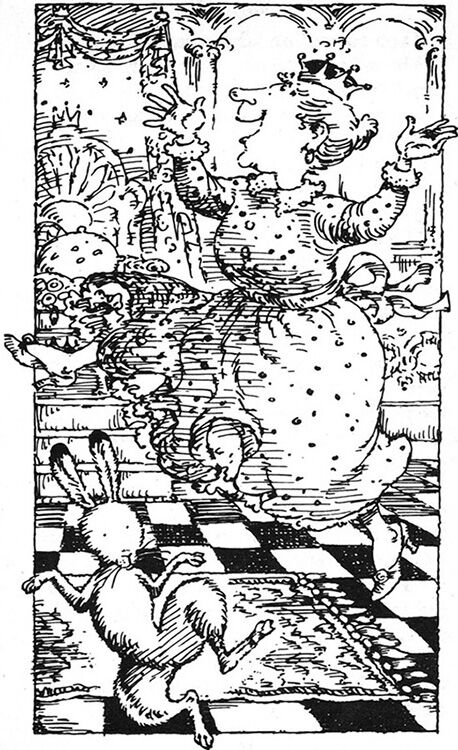
“You know,” said the hare, and vanished.
The queen sat down and gave the matter some thought.
Then she rang the bell and summoned her chancellor.
“Good morning, my dear Chancellor!” she said.
The poor man nearly fainted.
“I have some instructions for you, please, if you would be so very kind. First, call back my gamekeeper and ask him if he would stay in my employ – at double the wages, of course. Next, I am going to open my palace grounds for one day every month and give an enormous fête. Everyone’s invited.”
“Everyone, Ma’am? You mean, ordinary people?”
“They’re not ordinary people, they’re my people. No expense to be spared. Especially for music. I want the best musicians, who specialise in music to dance to.”
“Your commands shall be obeyed, Your Majesty,” said the astounded chancellor, bowing low.
“Not commands,” said the queen. “Requests. Thank you, Chancellor, that will be all.”
The chancellor backed out of the room in the approved manner, but he was in such a state that he tripped and fell over backwards.
The queen helped him up.
“I’m so very, humbly sorry, Your Majesty—” began the chancellor, all of a tremble.
“Entirely my fault,” said the queen.
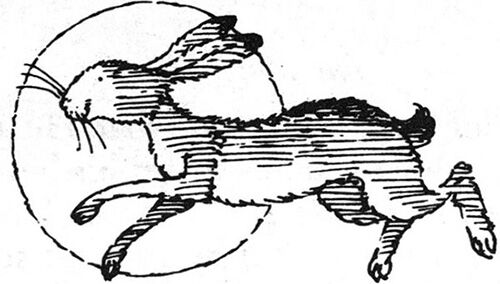
The Hare and the Flower
One night the magic hare was dancing and jumping about more energetically even than usual. The moon was full, and that was when he danced his best, so he was hurling himself about, trying to resist the temptation to use a bit of magic to enable him to jump that little bit higher than he could by himself. He managed not to, and did a really spectacular leap just the same, which carried him four or five feet above the grass that was whispering in the night wind.
He landed again, panting, and shouted:
“That’s the finest jump I’ve ever jumped, and I didn’t use magic a bit! What a rotten shame nobody was here to see me” – and suddenly he heard a tinkling sound.
It was like bells – very small, silvery ones.
He looked this way and that. He jumped a few ordinary jumps to get his head clear of the top of the grass, to see what had made that sound. But he couldn’t see anything.
There are lots of little noises in nature that only small animals would hear or notice. The hare’s world, down near the ground, was full of them. But he’d never heard one just like that tinkling bell-sound.
The fact was, in the hare’s ears, the ringing had sounded like applause. Applause for his Big Jump.
Well, it was a mystery – that was all. Life was full of them. The hare, who didn’t like not knowing things, tried to forget about it.
Next night, the hare was strolling down a lane when he saw a bright light. It was a car’s headlight that had been left on by mistake. A number of moths were battering themselves against the hot glass.
“Stop that,” said the hare. “You’ll bruise yourselves.”
“We can’t stop!” they cried in frantic little voices. “We have to reach it! We have to!”
He couldn’t persuade them, so he worked a small spell on the light, switching it off. The moths breathed sighs of relief and flittered away safely, forgetting to thank him. The hare, feeling a bit miffed, was about to hop off when –
There it was again! That tinkling sound, a little fainter than last night, but quite definite – like somebody, or something, saying “Well done!”
This time the hare was determined to find it. He searched through the grass along the verge, he jumped, he bounced, he called out:
“Who made that tinkling noise? Come on, out with it! Who are you?”
There was no reply.
The hare went to bed in a very puzzled mood.
The next day there was more work to be done.
Down by the river that ran past the hare’s home field, he heard the sound of crying, and rushed down to find a poor little cat with its leg torn open by a ferret.
Well, I say “poor little cat” – of course the cat wasn’t entirely the innocent victim, it had probably been trying to kill the ferret, but nevertheless it was a poor thing now because its leg was bleeding and it couldn’t drag itself along.
The hare had to do some magic very fast to help it home or it would have died there. The hare really could not bear animals dying, and did his best to save them whenever he could. He’d have saved the ferret, too, if it had been getting the worst of it with the cat.
After the cat was safely back in its own garden, with its owner making a big fuss of getting it to the vet, the hare (who was always a bit tired after a big output of magic) lay down in the sun. He had just stretched his back legs out behind and his front legs in front, when he heard that tinkling sound again.
This time he was on a clear bit of ground and it was broad daylight, so he could see much better. He snapped his head towards the sound, and suddenly he saw what was making it.
A pathetic little colourless flower was shaking its bells.
The hare hopped up to it.
“Hallo, Flower,” he said.
The flower had never been spoken to before. Its bells stopped ringing and it seemed to shrink down towards the ground.
“What’s your Latin name?” asked the hare politely and importantly. He loved the long names of plants and showed off with them.
“Haven’t got one,” whispered the flower.
“Your common-or-garden name, then,” said the hare kindly.
The flower shook its bells sadly.
“No name at all?” said the hare, shocked. “But that’s terrible! Everything has a name!”
“Not me,” whispered the flower. “Nobody’s ever bothered. I’m not in any of the garden centres or catalogues. No one ever picks me. I suppose I’m a nothing-flower.”
“No you jolly well are not!” exclaimed the hare robustly. “Your bells make the prettiest sound I’ve ever heard! Tell me,” he went on, trying to sound casual, “why were you ringing them just now – and the other night? Were they for me?”
“You did such lovely jumps,” whispered the flower. “And you helped those silly moths. And then, just now …”
“Yes?” pressed the hare, who loved to hear himself praised.
“You helped that little cat. You’re always helping,” it went on in its shy, whispering voice.
“I do my best, of course,” said the hare, scratching his ear. “I didn’t think anyone had noticed, particularly.”
“I did,” murmured the flower.
“Well, that’s very nice,” said the hare. “I mean, one likes to be appreciated.”
“What’s that?” asked the flower.
“You know – when people notice what you do and give you a word of praise occasionally.”
The flower was silent. The hare realised, with a jolt, that it had never been appreciated, ever.
He felt terribly sad suddenly. To go through life never being appreciated – and without even a common-or-garden name!
“Listen,” said the hare suddenly. “I’m going to give you a name.”
The flower seemed to straighten its stem, and its bells perked up and stood out instead of hanging limply.
“Are you?” it said in a louder whisper than before.
“Yes!” said the hare decisively. “I’m going to name you after me. You are a harebell.”
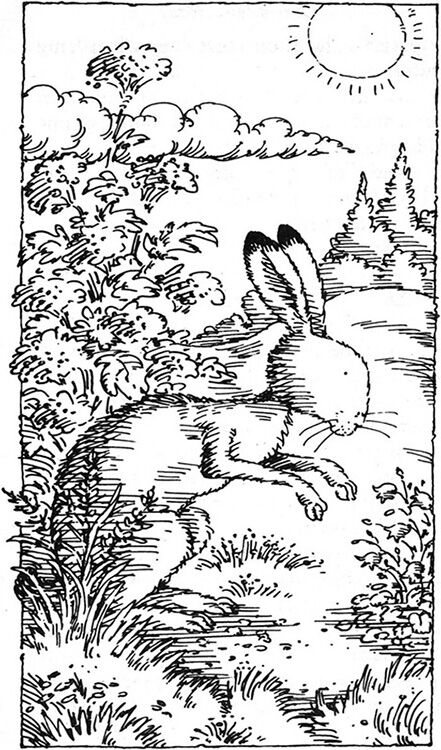
At this the flower grew much taller. It stood up above many of the grasses now, and – the hare blinked, was he imagining it? – its flowers took on a brighter colour. They were definitely blue now.
“Fantastic!” it exclaimed, and then added: “I suppose I couldn’t have a Latin name too, like other plants?”
That stumped the hare for a second, but he was full of invention and never could admit he couldn’t do something.
“Of course you could!” he said. “Your Latin name is – er – Campanula Rotundifolia.” He thought that sounded pretty good, and repeated it with a flourish: “Yes. Campanula Rotundifolia.”
“Wow,” said the Harebell in a voice shaking with awe. “Is that really me?”
“That’s you,” said the hare firmly.
“What does it mean?”
“‘Campanula’ means bells. ‘Rotund’ means round. ‘Folia’ means leaves. So it means a bell flower with round leaves.”
The Harebell shook its bells, which rang out a peal like happy laughter, and turned pink, then white, then blue again.
“See you around then!” said the hare.
“You bet!” shouted the Harebell.
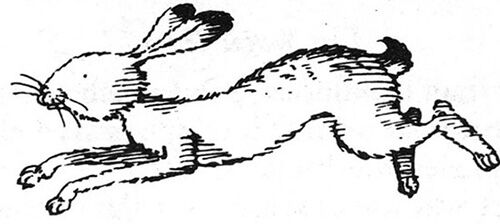
The Hare and the Orphan
There was once a beautiful girl who had been left an orphan when she was very young. Her home was in a little house in a deep, dark forest. Since her parents died, she had never left the clearing around her house, because she was so afraid of the darkness under the trees, the trees themselves, and whatever might lie beyond.
For food she ate the vegetables that grew in her garden, wild fruit that grew in the clearing, and for meat, she set snares and cooked the animals that got caught in them.
One day she found a fine big hare caught in one of her snares.
“Aha! You will make me an excellent supper!” she said.
To her amazement, the hare in her hands spoke to her.
“I shall be honoured to be eaten by such a beautiful woman,” it said, in a very pleasing and polite voice.
She was taken aback. But she only said, “Very well, I shall give you that honour.”
And she carried the fine hare back to her kitchen.
He didn’t struggle, but lay quietly in her arms, looking up at her in a trustful sort of way that made her feel rather uncomfortable, considering that she had quite made up her mind to eat him.
In the kitchen, she laid him on the table and turned away to get the stove burning. She put a pot of water on the stove, then she picked up a sharp knife and turned to him.
She half expected that he would have run away, in fact a bit of her hoped that he had; but he was sitting up on the table with his little front paws tucked to his breast.
“Have you got the onions?” he asked.
“Onions?” she said. “No. Why?”
“Goodness gracious grips! No hare should be cooked without onions,” he said reproachfully.
“Oh, all right then,” she said, and went out into her garden and pulled up some onions. She left the back door open on purpose, but when she returned the hare was still sitting on the kitchen table.
She prepared the onions and put them in the pot. Then she picked up the knife again.
“And the carrots?” the hare asked.
“You want carrots, too?” asked the girl.
“Of course! Whoever heard of eating hare without carrots?”
So she went outside again and pulled up some carrots. This time she left the door open very wide. But when she came back, the hare was waiting.
She scraped the carrots and put them in the pot. Then she picked up the knife with a strangely heavy heart, and turned to the hare.
“Where’s the bayleaf?” he asked.
“Bayleaf?”
“Don’t you know about bay leaves? They give a wonderful flavour, especially to hare.”
“You insist upon bay leaf?”
“No, I don’t insist. But everyone knows that hare doesn’t taste its best without a little bayleaf.”
She lowered the knife. “I would get some if I could,” she said, “just to please you. But I can’t.”
“Why not? There’s a big bay tree just at the far edge of the forest.”
The girl shivered.
“I can’t go there. I’m too frightened.”
The hare looked into her eyes.
“If you’re frightened, don’t go,” he said. “I’ll be cooked without a bayleaf.”
“But you won’t taste your best,” she said. “You deserve the very best cooking.”
He shrugged. “I don’t want you to be frightened. Cook me and eat me now, and enjoy me as much as you can.”
And he laid his head on the table.
She put the knife down.
“I’ll go and get the bayleaf,” she said.
“You’re a brave girl. I’ll show you the way,” said the hare.
They went into the forest together, the hare running ahead, the girl following. It was very dark under the trees. At first she was almost too terrified to walk. But the hare danced along the path in front of her, and after a little while she found herself dancing, too.
At the far end of the forest she saw the bay tree. She saw the wide road. She saw the town in the valley, and the beautiful mountains beyond, and the sky beyond that. She saw the world she had never seen.
Конец ознакомительного фрагмента.
Текст предоставлен ООО «ЛитРес».
Прочитайте эту книгу целиком, купив полную легальную версию на ЛитРес.
Безопасно оплатить книгу можно банковской картой Visa, MasterCard, Maestro, со счета мобильного телефона, с платежного терминала, в салоне МТС или Связной, через PayPal, WebMoney, Яндекс.Деньги, QIWI Кошелек, бонусными картами или другим удобным Вам способом.



